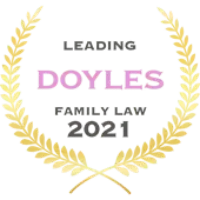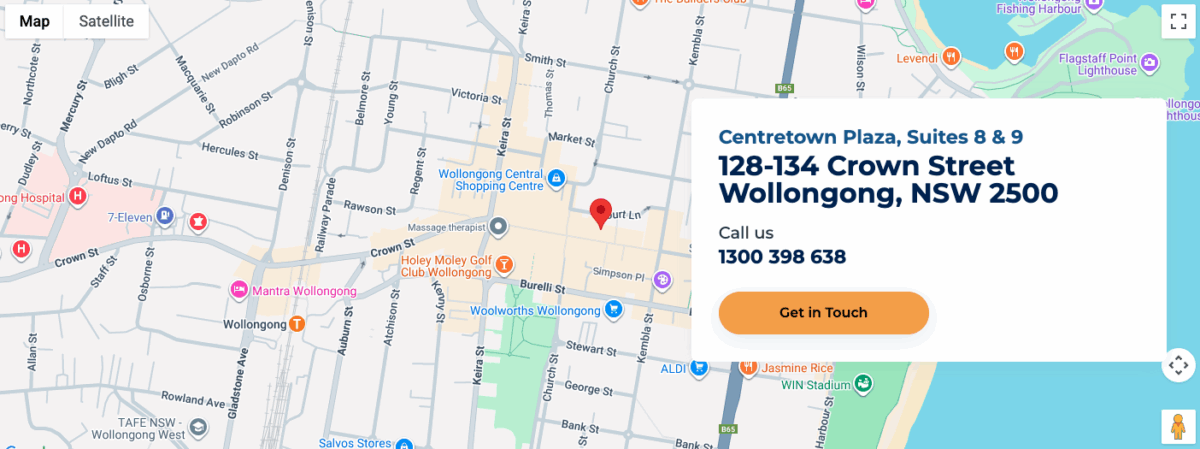Life in Wollongong offers so much – from our stunning coastline and vibrant city centre to a strong sense of community. And just like you may need local experts to help you renovate your house or fix a plumbing issue, if you’re facing divorce or separation in Wollongong, you also need local specialist divorce lawyers who can provide you with expert legal advice and clear guidance. The right support makes all the difference.
At Watts McCray, our divorce lawyers in Wollongong help clients move forward with dignity and confidence when going through a divorce or separation. As accredited specialists in family law, we combine deep legal expertise with an understanding of the local courts, Wollongong and the surrounding community, as well as a view of the services that will best help you and your family.
Whether your separation is amicable or complex, we’ll work alongside you to protect your interests and create a less stressful and easier path toward your next chapter.
The divorce process
In Australia, divorce is a no fault system. That means that the only requirements for getting a divorce is that the marriage has ‘irretrievably broken down’, meaning you have been separated for at least 12 months and either you or your ex-spouse is a resident or citizen here in Australia. Once those requirements are met, either party can file for divorce for any reason, once they have been separated for the required 12 months.
If you have children under the age of 18, you will also need to have suitable parenting arrangements in place before you will be granted a divorce.
When you enter into the divorce process, it can feel overwhelming. But our team of Wollongong divorce lawyers are here to guide you through each stage.
Stage 1: Establish a clear date of separation
We’ll help you clearly document your separation date, which is an important step for eligibility for divorce. However, you can be considered separated even if you’re living under the same roof. If you are living under the same roof you will also need to supply additional evidence – usually in the form of an affidavit – to show that you are living a separated life.
Stage 2: Filing your application
We can prepare and lodge your divorce application, ensuring that you’re prepared for the best outcomes and that all the procedural requirements are met. This may include:
- Your marriage certificate (plus a certified translation if it’s not in English)
- Proof of jurisdiction (citizenship, residency or visa status)
- Supporting affidavits, if required, including proof of parenting arrangements where required
Stage 3: Service
When it comes to divorce in Wollongong, in fact across Australia, you may file jointly – that is together with your ex-spouse – or singly. If you do file a sole application, your spouse must be formally served with the documents.
There are specific Court rules about how this process needs to be undertaken. However, our team can help you arrange service in accordance with those rules and with an eye to minimising delays as well.

Stage 4: Court hearing
The next stage in the divorce process is the Court hearing. In our local Wollongong area, almost all Court hearings will be held in the Federal Circuit and Family Court of Australia at Commonwealth Government Centre, Level 1/43 Burelli Street, Wollongong.
In most cases, you will not be required to attend the divorce hearing, even if you have children.. However if you do need to attend court, our lawyers can appear on your behalf or with you.
Stage 5: Divorce order
One month and one day after the divorce hearing, if the court is satisfied that all the requirements wre met, your divorce becomes final. The Court will issue your divorce order and you’re free to move on or even remarry.

Matters connected to divorce
Your divorce, even when final, doesn’t finalise other legal issues that arise from separation. This includes:
- Parenting arrangements – coming to an agreement about your children, including their living arrangements and decision-making responsibilities that are in the best interests of your child or children. Although you do have to have the organization of your parenting arrangements underway, or preferably finalised in order to receive a divorce order if you have children under the age of 18, arrangements for them will be a separate legal process.
- Child support – negotiating fair and sustainable child support agreements tailored to your family’s needs.
- Property settlement – dividing assets and liabilities, including superannuation and inheritances in a fair and lawful way.
- Spousal maintenance – assessing entitlements and obligations for ongoing financial support.
- International divorce – managing issues relating to jurisdiction, foreign marriage certificates, overseas assets and parenting across borders.
It’s important to note that some of these matters have strict time limits. For example, you must start property settlement or spousal maintenance proceedings, or reach an agreement about those matters, within 12 months of your divorce becoming final.
Why choose Watts McCray Wollongong?
Our Watts McCray Wollongong team are locals to the Wollongong area as well. Our roots in the community let us combine our local expertise with genuine legal knowledge, drawing on our understanding of Wollongong’s court processes, community networks and support services to deliver the best possible outcomes.
When you choose our Watts McCray team, you’ll have the support of accredited specialists in family law with decades of experience guiding individuals and families through divorce and separation. This depth of experience means we understand how to help drive amicable solutions while supporting you to get the best outcomes for your family.
Whether your matter is resolved through negotiation, mediation or Court proceedings, our focus is always on solutions that are practical and tailored to your unique situation. We understand this can be a challenging time. So, our team will always take the time to listen, understand and guide you forward with your specific needs at the front of mind.
Our proven track record spans everything from amicable agreements to complex, high-conflict cases. With the Watts McCray Wollongong team, you can be reassured that your future is in capable hands.
Where you’ll find us in Wollongong
Watts McCray Family Lawyers Wollongong are located at:
Centretown Plaza, Suites 8 & 9, 128-134 Crown Street, Wollongong NSW 2500
Getting here by public transport
Our office is just a short walk from the Wollongong Railway Station, which is serviced by frequent NSW TrainLink South Coast line services from Sydney, Kiama and nearby suburbs. From there you can take the free Gong Shuttle (routes 55A and 55C). This convenient loop service connects the station to the CBD, including key destinations like Wollongong Central, TAFE and local beaches.
Several bus routes also run along Crown and Keira Streets. These are easily accessible and drop you just a block from our office.
Parking options
We offer up to two hours of free appointment parking. Additional public parking is also available on street, with many spaces metered during business hours. There’s also additional public parking nearby at the Wollongong Central Multi-Level Car Park and at the P3 Purple Car Park via Kenny or Keira Street.
How to start the divorce process with our Wollongong lawyers
Our process is simple to get started and designed to make things smooth and stress free for you.
To get started, simply book an initial consultation. During this consultation we’ll discuss your relationship history, key dates (such as when you were separated), your living arrangements and parenting arrangements (if any), children involved and financial information. We’ll then be able to create a tailored plan for guiding you through the divorce process while achieving the best outcomes.
At this time, we can also discuss other matters that arise during divorce and separation, including parenting arrangements, property settlement, spousal maintenance and more.
Documentation required
When you come to your initial consultation, you don’t necessarily need to bring any documentation. However, it can make things go more quickly and smoothly if you can bring a copy of your marriage certificate and proof or Australian citizenship, residency or visa. If you also have proof of the date of your separation, that would be helpful as well.
FAQs
In most cases you will not need to attend Court to finalise your divorce, even if you are filing singly. However, if , or the other party is trying to oppose the divorce then you may need to attend.
In any circumstances, if there are issues with your divorce application, difficulty with service or you need to seek orders from the Court, then you will need to attend Court for those matters.
In Australia, we are a no fault divorce country, so it doesn’t matter who files for divorce first. That being said, sometimes filing first or second can be a strategic advantage. It’s worth speaking to your family lawyer to see what’s best in your particular situation.
In Australia we have ‘no fault’ divorce which means you can file for divorce at any time without the other partner having to agree. If your former spouse won’t agree to a divorce, we can help you prepare and file a sole divorce application.
This used to be a requirement under the Family Law Act, but as of 10 June 2025, that requirement has been removed. Now you can apply for divorce without attending counselling, regardless of how long you’ve been married.
Once your divorce application is approved by the Court, your divorce will become final one month and one day after the hearing date. The entire process is highly dependent on the circumstances of your divorce, how quickly documents are prepared and served and the Court’s schedule. However, you can typically expect the process to take around three to four months.
No. You must wait for your finalised divorce order before you can remarry. This is typically one month and one day after the date of your divorce hearing.
Only in very limited circumstances, for example, if you can prove that you haven’t been separated for 12 months or there’s a chance of reconciliation between you and your ex. If you can’t prove these, then a divorce will be granted once all the requirements are met, even if only one party wants the divorce.
In Australia, the terms ‘divorce lawyer’, ‘divorce solicitor’ and ‘family lawyer’ are often used interchangeably and mean the same thing. At Watts McCray, our family lawyers handle all aspects of separation, divorce, parenting and property matters.
A dissolution of marriage is the legal term for divorce. It refers to the formal end of a marriage under Australian law. Once a divorce order is granted and becomes final, your marriage is legally dissolved.
Yes. You can apply for divorce in Australia even if you were married in another country, provided you or your spouse are an Australian citizen, ordinarily live in Australia or regard Australia as your permanent home.
You’ll need to provide your marriage certificate (and a certified translation if it’s not in English) along with proof of your connection to Australia. If your spouse is living overseas, special rules apply for serving the divorce documents.
Our Wollongong divorce lawyers can guide you through these steps and ensure your application meets all the necessary requirements.
An annulment (technically called a decree of nullity) is a court finding that, legally, the marriage was never valid from the start. It erases the marriage as though it never legally existed.
An annulment can’t be ordered because the marriage didn’t work out. It’s only possible under very specific circumstances, such as:
- One or both parties were already married
- Parties are closely related
- The celebrant wasn’t authorised, or the ceremony didn’t meet legal requirements
- One party lacked genuine consent due to duress, fraud, mental incapacity, or was underage without proper approval
By contrast, a divorce recognises that the marriage was valid but has broken down irretrievably.
Contact our Specialist Family Law Team
Do you have a question about family law or relationship law?
Contact us today, and a member of our team will get back to you soon.
Meet our Lawyers
Contact our Specialist Family Law Team
You can contact our divorce lawyers to assist you with the divorce process.

Other Family Law Services



Accredited to deliver
Choose a team with more accredited lawyers.




